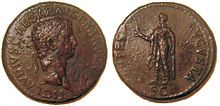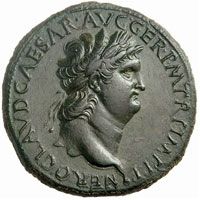
To Emperor Nero (37-68) several horrific crimes are attributed, but most of them are fabrications, part of the damnation of his memory put up by the Flavian dynasty which replaced the Julio-Claudians, extinguished at Nero’s death. Nero was the last of the Julio-Claudians and as such a true ‘living treasure’ having as ancestors the Gotha of classic Rome: Caesar, Augustus, Drusus, Marc Antony, Germanicus, Agrippa and so on. While the Flavian dynasty was founded by Nero’s general, Vespasian, who was not a true Roman, originating from a town in the Sabine region, known today as Rieti. The work of historical defamation against Nero was so successful that persists to our days, with his name still associated to the worst figures in human history.
The first writer attempting to salvage Nero’s reputation was Girolamo Cardano (1501-1577?) who in 1562 published in Basel the Neronis Encomium a work which was seen as a pure scholastic paradox, a sort of rhetoric exercise, while in reality constitutes revolutionary history.
Most history buffs know the list of Nero’s supposed crimes. Let us mention just a few: he played the fiddle while Rome was burning, but in reality he was not even in the city when the great fire destroyed the capital of the Roman Empire. Then he exterminated thousand of Christians, accusing them of having wilfully started the fire, while at that time there were few Christians in Rome and he even seemed to have liked them, because of his wife Poppea who was strangely well disposed towards all Jews.
Then he murdered his mother, Agrippina. Yes, this is true but she was a ‘serial killer’ who was plotting to have him assassinated. Then he stands accused of having murdered his beloved wife Poppea Sabina with a kick, while she was pregnant, because she complained about his getting home late for supper. It was possibly a case of haemorrhage caused by her pregnancy. A last one: he was a cheap artist who with his theatrical antics tarnished the dignity of his office, while in reality he was a gifted musician and poet, a fact that was even accepted by his worst detractor, the historian Suetonius.
Let us know examine what is normally considered one of his minor crimes: the death of his cousin and adoptive brother, Britannicus (41-55), the son of his grand-uncle and adoptive father, Claudius (10 a.C. – 54) and Messalina.
Messalina had been dispatched by Agrippina’s scheming to the executioner’s axe, then Agrippina was free to marry Claudius. Then she craftily plotted to exclude Britannicus from the dynastic line and put her son, Nero, in his position. It seems that Claudius at a certain point was reconsidering his decision and was planning to give back to Britannicus the crown of the Empire. This plan to exclude Nero made Agrippina plot his murder, a plot carried out with a large mushroom laced with poison. Britannicus did fall dead soon after, in the year 54, during a banquet, while Nero and Agrippina were present. On noting Nero’s indifference when Britannicus collapsed, Agrippina played the part of mother who discover that her son is a monster. She played it so well that rumours begun to circulate that Nero was responsible for his killing. Why Agrippina had behaved like that? The reason of her behaviour may be found in the fact that soon after Nero’s sat on the throne he begun to show an independent mind, no longer accepting to be subject to his mother wishes and caprices. He had dismissed Pallas, the Secretary of the Treasury and Agrippina’s trusted man, it was then that in a fit of rage Agrippina had told Nero that he had regretted having given him the Empire.
The first sign of Nero’s rebellion was the abandonment of his wife, Octavia, sister of Britannicus, spending his time with his sweetheart Claudia Acté, a Greek freed slave. That was a difficult union but which endured until Nero’s death. So much so that when in the morning of the 9 June 68 Nero cut his throat with a sword, only Acté had the courage to come forward and claim his body to have it properly buried.
Was then Nero the murderer of Britannicus? Or that was just an accident or, again, was Agrippina who had him murdered? The last hypothesys seems the least probable because Britannicus at that time was useful to Agrippina as a pawn she could play to keep her son in check. If Nero misbehaved she could have had him murdered and then replaced with Britannicus.
Let us study what the historians said about the circumstances of his death. The first is Tacitus, who was born in the year following the death of Britannicus and he may have met people who knew Nero. I am translating from Tacitus’ Annals (Book XIII):
It was usual for the princes of blood to sit together with other nobles of the same age, under the watch of their parents, on a separate table, with ordinary cutlery and dishes. There Britannicus was having dinner. What he was eating was always first tasted by one of the servants, in order to alert the prince if the servant show problems. A cup with liquid already tasted but very hot was given to Britannicus; he refused it because was too hot and some cold water was added, there was the poison. Such poison worked his lethal effect so quickly that he lost the voice and the breath. Some took to run here and there, while some of the most alerted did not move with their eyes fixed on Nero, who said with great self-control, that it was one of his usual epylepsy attacks and sight and senses will gradually return. That was a disease who had afflicted him since his early childhood while Agrippina who looked terrorized tried to hide her horror, thus proving that she was not part of the plot, like Octavia, sister of Britannicus, who saw her sole refuge perish in front of her eyes, after the murder of her father. Also Octavia had since learned how to hide her emotions and her grief. Therefore, after this incident the dinner went on normally.
Then Tacitus adds that, after having realized that Britannicus was dead, they quickly arranged for his funeral and his body was burned on a pyre and then buried at the Campus Martius under strong rain and a terrible storm with lightenings and thunders, which was interpreted as a sign of the gods’ discontent. Tacitus find also time to gossip on the fact that several writers noted that Nero may have sodomized his younger brother, adding insult to injury.
Suetonius, speaking about the death of Britannicus in his Lives of the Caesars (33 II) makes himself ridiculous mentioning that Nero murdered him because he was envious of his beautiful voice. Then he adds that the poison he had used was supplied by Locusta, a famous lady expert in poisons, who had provided it to Agrippina to despatch her husband, Emperor Claudius.
Finally we have Dio Cassius in his Roman History (Book LXI) written nearly two centuries after the facts, who works even more with his brilliant fantasy, giving us an image worth of an horror movie, with the dead body of Britannicus enlightened by the lighting and made wet by the furious rain, adding:
Nero murdered Britannicus using poison and then when his skin became livid because of the poison, they covered it with chalk but while the body was taken to the forum a strong rain washed away the chalk, so that everybody could see the truth of what they had heard.
In antiquity there were no poisons, taken as drink or food, which could kill a man in a matter of seconds or even minutes and, in fact Agrippina dispatched her husband Claudius after several hours of agony, helped by her doctor in applying several doses of poison directly into the throat using a feather.
To get a scientific opinion basing on the scarce evidence available, we have asked to a friend, Professor Gavyn Joynt, President of the Centre for Anaesthesia and intensive Care at the Chinese University of Hong Kong. Here is his reading of the historical facts:
“It seems that Nero noted, as Britannicus was still reclined in seeming unconsciousness, that this was a common occurrence from periodical epilepsy, with which Britannicus had been afflicted from his earliest infancy, and that his sight and senses would gradually return. Then we read that the skin became livid through the action of the poison. Well, I think there may be several possibilities here, but the likely natural one is a form of epilepsy, causing death either directly, or by the unconscious state causing him to obstruct his airway. The fact that he had been eating and drinking, would add the risk that his airway had become obstructed by food while he was unconscious. He could have suffered from many forms of epilepsy, but there is no mention of very obvious epileptic and “generalized tonic-clonic convulsions (GTC) on this occasion (the common jerky type of seizure). So it is possible he suffered from a form of “absence seizures” or “complex partial seizures” that manifest itself in more subtle ways. Claudius too may have suffered from epilepsy (especially when young) and then apparently had improved. Thus Britannicus would have been at a higher risk of inheriting a form of epilepsy and is indeed possible that he suffered from a juvenile form of “absence epilepsy” or even “juvenile myoclonic epilepsy” (JME) causing intermittent seizures. These usually are short seizures (up to 20 seconds) which don’t provoke a collapse but may sometimes progress to cause more severe seizures. Death is uncommon just from the seizure itself, but it is possible that while eating, collapse and unconsciousness, followed by food obstructing the trachea (breathing pipe) with a bolus of food to block in the oesophagus may cause asphyxia. It would also likely contribute to the “livid” state of the skin post mortem. During a simple absence seizure, a person usually stares into space for less than 10 seconds. Because they happen so quickly, it’s very easy not to notice simple absence seizures — or to confuse them with daydreaming and not pay attention. During complex absence seizures, a person will make some kind of movement in addition to staring into space with the ends eyes and mouth.”
Professor Joynt – a collector of ancient Roman coins and a classic scholar – adds that even Claudius, according to Suetonius, had been affected by similar attacks, and his mother though he was mentally retarded in his youth ‘the vigour of his mind and his body seemed obfuscated.’ A sign of juvenile absence, which he passed down to his unfortunate son, Britannicus?

